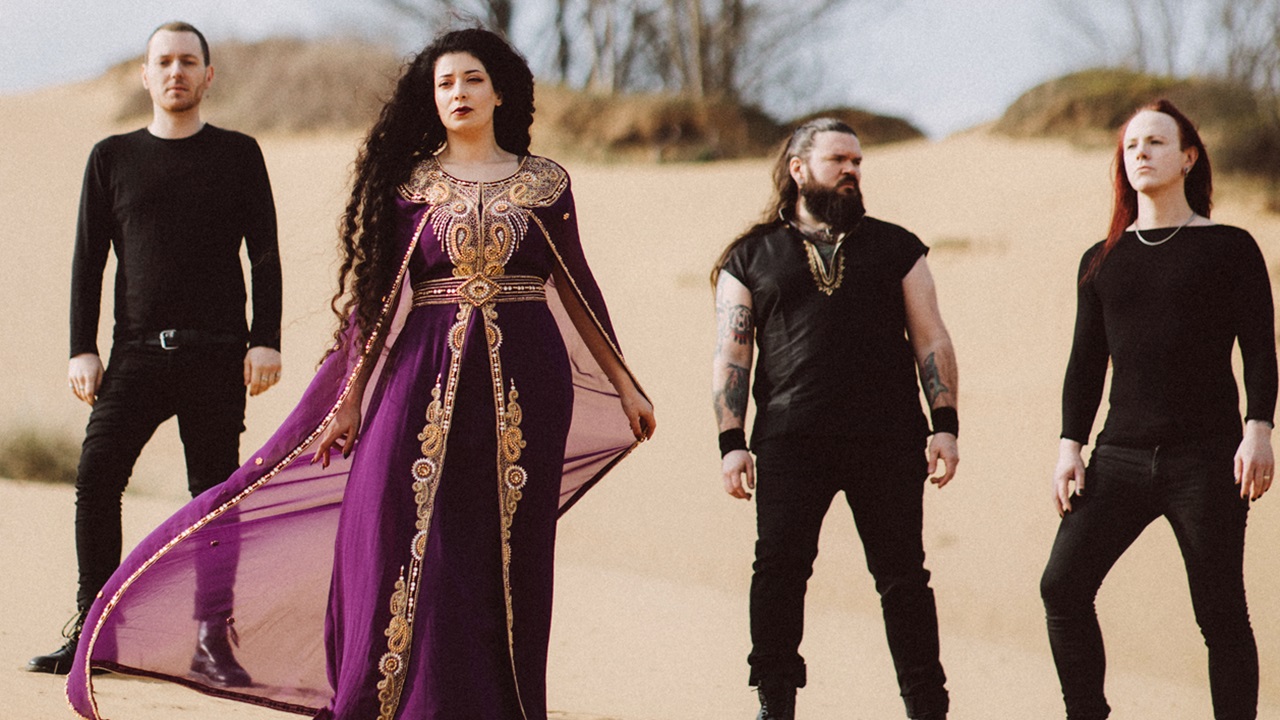
“I think a lot of people in heavy metal understand what it’s like to be looking in from the other side,” says Nina Saeidi, vocalist of prog metallers Lowen. “This band is my way of exploring that.”
The daughter of Iranian exiles and raised in Britain, Nina’s musical journey began when she was a young child, learning how to play various instruments. But despite that, she admits she “grew up in a house where sound was not really allowed”, and the only music was traditional Iranian folk. As a teenager, she made her own discoveries, noting Akercocke’s 2007 album Antichrist and System Of A Down’s Mezmerize/Hypnotize records as formative influences.
“I was fascinated by how transgressive the Akercocke album was, and how System used Middle Eastern music and metal,” she says. “I was like, ‘Oh, I didn’t know you could do that!’ I didn’t know that there were people doing things like this. It made me think, ‘Maybe there’s a space for me too.’”
Nina formed Lowen in 2017 with guitarist Shem Lucas. Within a year, they’d released their debut EP, A Crypt In The Stars. Though work on this year’s debut, Do Not Go To War With The Demons Of Mazandaran, was slow, the band were meticulous about crafting a potent and fascinating sound that incorporates both Nina’s Iranian heritage and underground doom and prog metal sensibilities. To that end, Nina even sings in a variety of languages, including Farsi and dead tongues such as Akkadian and Sumerian.
“Singing in Farsi connects me to my culture,” she explains. “I’ve always existed in this liminal space between two cultures and not really been fully accepted by either of them. Lowen is a space where I can explore this strange exile that I live in and connect to places I can never go.”
Within Lowen’s sound, there’s a sadness and morbidity that’s palpable: the weight of not belonging and mourning for a life out of reach. Standing above it all, however, is power. Do Not Go To War With The Demons of Mazandaran contains tides of crushing, Meshuggah-like heft; intricate, progressive song structures; demonic doom riffs and historically elaborate themes. Lyrically, it comprises melodic war poems, “ancient diss tracks”, protest anthems and even incantations to raise the dead.
It’s a reclamation of identity, as well as a union and celebration of culture, funnelled through primal Middle Eastern rhythms and Nina’s multilingual, commanding yet sorrowful voice that often invokes the use of Tahrir, an undulating type of singing that’s an important part of Persian music. Nina freely admits that embracing her Iranian heritage is complex. The Middle Eastern country’s stance on metal bands is no secret, with instances of bands like Confess and Arsames being arrested and fleeing the country well reported. “It’s illegal for women to sing unaccompanied,” Nina says solemnly. “They will kill you.”
For this reason, journeying to her ancestral home remains an impossibility. “Though it’s not the case for all Iranians in the diaspora, for me personally, it’s just too dangerous to go back,” she says. “I’m doing lots of things that would be considered illegal if I went there.”
Building upon the Middle Eastern influences of her youth, alongside bands such as Akercocke, Opeth, Queen and Enslaved, the name Lowen itself is derived from this fusion of the East and West.
“It’s basically a bastardisation of the Germanic word for lion,” Nina explains. “In Mesopotamia, excavations have shown building inscriptions of kings killing lions, because they’re symbols of chaos and power. They’re brutal images. In the West, they’re the symbol of pride. In Lowen, we try to embody this juxtaposition.”
Do Not Go To War With The Demons Of Mazandaran offers a rich tapestry of historical knowledge. Its title is based on a chapter from the Shāhnāmeh, aka the Persian Book of Kings, an epic poem written around 1,000AD. The chapter in question follows the story of the greedy King KayKāvus who, against the better judgement of his advisors, invades a paradisal land inhabited by demons, sorcerers and beautiful women. The arrogant king’s attempts prove fruitless, and the white demon, Div-e Sepid, destroys his army by summoning a storm. Metal stuff, to be sure.
“I think the past is far enough away that it’s almost like an alien world,” Nina says. “Yet somehow, that distance can be bridged by shared human experiences. There’s a sense of comfort that we’ve always been the same - we’re still fighting about lines on maps. A lot of the conflicts of today are exactly the same as the conflicts of 8,000 years ago.”
Although Do Not Go To War With The Demons Of Mazandaran is heavily inspired by historical texts, it also draws on contemporary sources. Songs such as Corruption On Earth and Waging War Against God rage against the death sentences placed on women protesting against the Islamic Republic of Iran during the ongoing Woman, Life, Freedom movement. The movement began in 2022 following the death of Mahsa Amini, a young Iranian woman who was reportedly arrested for not wearing the hijab and later died under suspicious circumstances relating to suspected police brutality.
“They’re still imprisoning people, torturing people, executing people,” Nina seethes. “But I also want to make it clear that I’m not criticising Islam, I’m criticising the regime, because they are using religion - which can be a very beautiful thing – to control, corrupt and kill.”
Do Not Go To War With The Demons Of Manzadaran is out now via Church Road.







